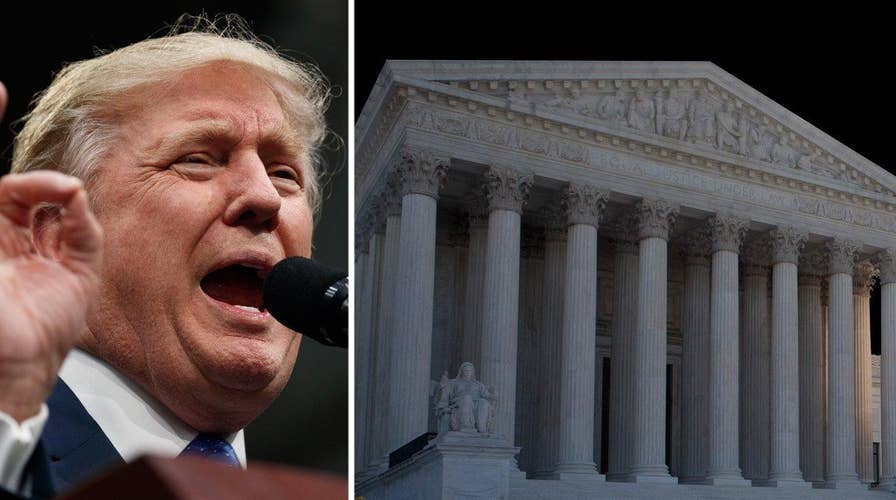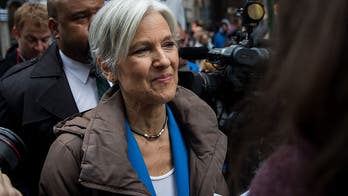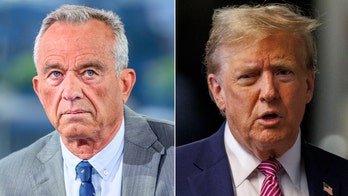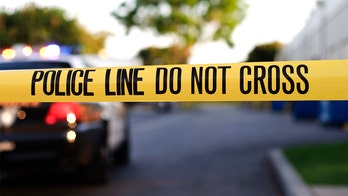Court-watchers await Trump's Supreme Court pick
On 'Special Report,' Shannon Bream provides insight into some of the names on the president-elect's list
Voters chose Donald Trump, but now he hopes to return the favor with a looming far-reaching decision that could impact the lives of Americans on a range of hot-button issues for another generation.
No longer a question of if, but whom and when, the next member of the U.S. Supreme Court will almost certainly be a conservative, and perhaps the first of several nominees who could cement this bench's current shaky right-leaning majority. Let the political parlor games begin.
As the Trump transition team moves to first fill key cabinet and White House staff positions, parallel post-election focus on the high court vacancy has now started to coalesce, according to legal sources close to the vetting process.
Some conservative advocacy groups have quietly suggested Trump signal before his inauguration who his pick would be, to jump-start the Senate confirmation process, and allow the president-to-be to turn his attention to other "First 100 Days" agenda items like immigration and the budget.
But sources suggest a formal announcement only after Jan. 20, when full input from the White House Counsel's office and the attorney general would occur, including FBI background checks of the finalists and eventual nominee.
Trump has taken the unusual step of months ago publicly naming 21 individuals as potential nominees-- all but one sitting state or federal judges.
"I will pick only from that list, because they were a little concerned, because I was never a politician so maybe he'll go out and pick a liberal, OK?" Trump told Fox News. "That's not happening. Only from that list I'm going to pick, only. We're not going outside that list."
Two names getting early attention from conservative legal activists are federal appeals court judges Diane Sykes of Wisconsin and William Pryor of Alabama.
While the timing of the announcement is unclear, court watchers say whoever is chosen, will have a proven judicial record to please the right.
"This election is a massive game changer, as far as the Supreme Court is concerned," Thomas Dupree, a former Bush 43 Justice Department official, and a top appellate attorney told Fox News. "When you look at the list of 21 individuals-- that is a great list, you're not going to go too far wrong choosing someone from that list."
First of Many?
Liberal legal advocates had hoped a Hillary Clinton presidency would move the Supreme Court solidly to the left for the first time since the 1970s, but now admit the ideological status quo is preserved, likely to be strengthened.
"It does mean an entrenched conservative majority. but the real impact will be if there are more vacancies opening up in the next few years-- possibly Justice [Ruth Bader] Ginsburg, [Justice Stephen] Breyer or [Justice Anthony] Kennedy," Elizabeth Wydra, president of the Constitutional Accountability Center, told Fox News Chief Legal Correspondent Shannon Bream. "That majority could do things like overturn Roe v. Wade," the 1973 decision legalizing abortion.
Those three justices will all be in their 80s by the end of the new president's first term.
Short-handed and evenly split ideologically since the sudden death in February of Justice Antonin Scalia, the Supreme Court has moved gently into its new term, putting off consideration of some high-profile cases, presumably until its newest member is sworn in, something that may not happen until spring.
Exit polls show 70-percent voters rated Supreme Court appointments as the most important or a major factor in their decision. And of those who identified it as a priority-- 56-percent voted in favor of Trump versus 41-percent for Clinton.
Since Trump would be replacing one conservative with another, the needle does not move much ideologically, but that confirmation could serve as a template for bitter fights to come, if liberals Ginsburg and Breyer, and the moderate-conservative "swing" vote Kennedy step down. Then all bets would be off.
Proven Records and Reliability
The "21"-- as the list of potentials are known inside the Trump campaign-- are qualified jurists, but many were not on the political radar of the legal establishment, perhaps reflecting the GOP nominee's "outsider" persona. The list was culled with the aid of the conservative Federalist Society and Heritage Foundation, but no one has yet emerged publicly as a favorite.
Several of the judges have said they were not notified beforehand of their placement on the list. And one federal appeals court judge on the original Trump list told Fox News that since his name first appeared months ago, he has never been contacted for vetting nor has any of his colleagues who are also on the list.
All eight current justices attended Harvard of Yale Law School and were seen as politically connected within Democratic or Republican legal circles.
But as usual, "reliable" will be the benchmark for any finalist for the high court under a Trump presidency, following the blueprint of President George W. Bush. No surprises in the mold of Justices David Souter and John Paul Stevens, chosen by Republicans, but who carved a mostly liberal record.
Conservative legal advocates advising the Trump forces have privately touted their favorites, and divided the selection scenarios into three categories:
-- Proven conservatives who have been through a rigorous Senate confirmation, such as federal appeals court judges Neil Gorsuch, Raymond Kethledge, Steven Colloton, and Thomas Hardiman. Federal Judge Amul Thapar of Kentucky, who is of Indian descent, is also being discussed, perhaps for a future vacancy.
-- State supreme court judges that would also offer a measure of geographic diversity: Joan Larsen (from Michigan, who clerked for Scalia), Allison Eid (Colorado), David Stras (Minnesota), and Don Willett (Texas).
-- A "wildcard" like U.S. senators Kelly Ayotte (who lost her New Hampshire re-election race) or Mike Lee (of Utah, who had backed Ted Cruz and revealed a "protest" presidential vote for Evan McMullin).
The most intriguing surprise could be Sen. Ted Cruz, R-Texas, Trump's bitter primary opponent, who has only recently came around in his support of the nominee. Cruz, who clerked for former Chief Justice William Rehnquist, met privately with Trump on Tuesday.
Other names not on the Trump list but long touted by Republicans include federal Judges Brett Kavanaugh, Jeffrey Sutton, and Jennifer Elrod; and former Solicitor General Paul Clement.
Senate Majority Leader Mitch McConnell says he has some names he would offer the president-elect in coming days.
A "Fantasy SCOTUS" crowdsourcing poll launched this week to predict the nominee has Gorsuch and Pryor at the top, along with Cruz, Sykes and Kethledge.
"All of those people are individuals who care very deeply about the rule of law and preservation of our Constitution," said Leonard Leo, executive vice president of the Federalists Society, who met personally Wednesday with Trump about the vacancy. "He's looking for someone who's independent, courageous, smart, very high quality."
Beyond the names, Trump himself campaigned with few specific criteria, but told CBS' "60 Minutes" in recent days he would appoint "pro-life judges." And during one of the presidential debates he promised his picks will "respect the Second Amendment and what it stands for, what it represents."
About eight of the judges on the "List of 21" appeared appearing at the Federalist Society's annual convention in Washington last week, appearing on panels and affirming their conservative bonafides.
Several told Fox News they were flattered to be considered for any high court vacancy, but refused to talk specifics about their qualifications or any vetting from the transition team. The convention mood was upbeat, as court-watchers are all too aware Trump has the potential to remake the entire federal judiciary, as his two predecessors did. Notably, Presidents Bush and Obama placed two justices each on the high court.
Options and Obstacles
Senate Democrats, still stung by the unprecedented failure of the majority to allow a vote Obama's choice of DC-based federal Judge Merrick Garland to the high court, have some options to thwart the new president's pick.
In 2013 while in the majority, they created the so-called "nuclear" option to block minority-led filibusters for any nominations-- except notably for the Supreme Court.
Days before the 2016 election, when a Clinton victory looked promising, vice presidential candidate and senator Tim Kaine suggested a Democratic Senate majority could expand the "nuclear" option to push through any Clinton high court nominee.
But with the scenarios switched, Democrats will now have to decide if they can or want to filibuster, and Republicans will have to decide how to respond.
Sen. Charles Schumer, D-N.Y., the next minority leader, was cautious over parliamentary ploys, saying just after the election, "I hope we won't get to that."
Such filibuster threats have rarely succeeded in recent years. Then-senator Obama supported a nascent effort to block the 2006 confirmation of Justice Samuel Alito.
Yet some determined progressives say another option is in play, one that Obama himself controls: name Garland now to the Supreme Court in a "recess" appointment, arguing the Senate has abdicated its "advice and consent" constitutional authority by refusing to act on the pending nomination.
Among supporters of this option: entertainer and liberal activist Barbra Streisand, who wrote on her Facebook page, "If you are concerned about the Supreme Court, please consider going to this website and signing a petition asking President Obama to 'appoint' Merrick Garland."
And to add to the mischief, some progressives suggest a President Trump name his sister Maryanne Trump Barry, a federal appeals court judge in Philadelphia on senior or semi-retired status. Her age (79) and lack of over-arching political philosophy have kept her out of the spotlight, something the intensely private judge probably appreciates.
As for the short-handed high court, Justice Ginsburg is the only member to comment publicly on the election results.
"There is an existing vacancy, and President Trump will fill it," she told a DC audience this week. "Then, perhaps, Congress will do some work. One of the reasons why the court hasn't had as many petitions as usual is that there hasn't been any legislative activity."





